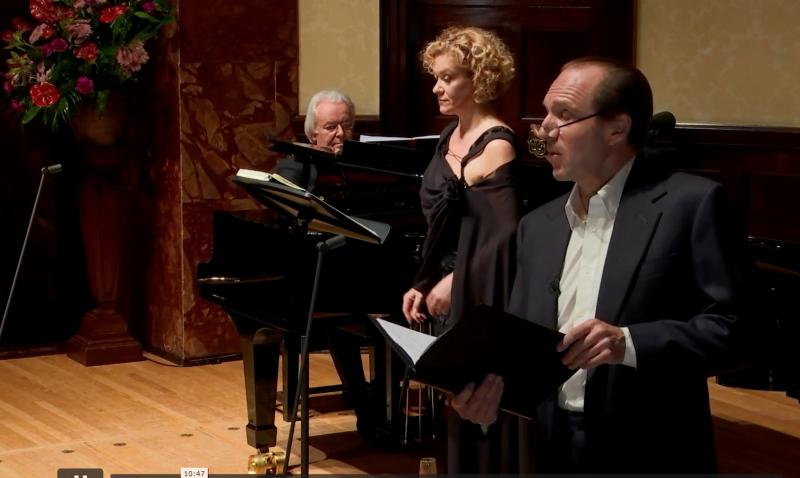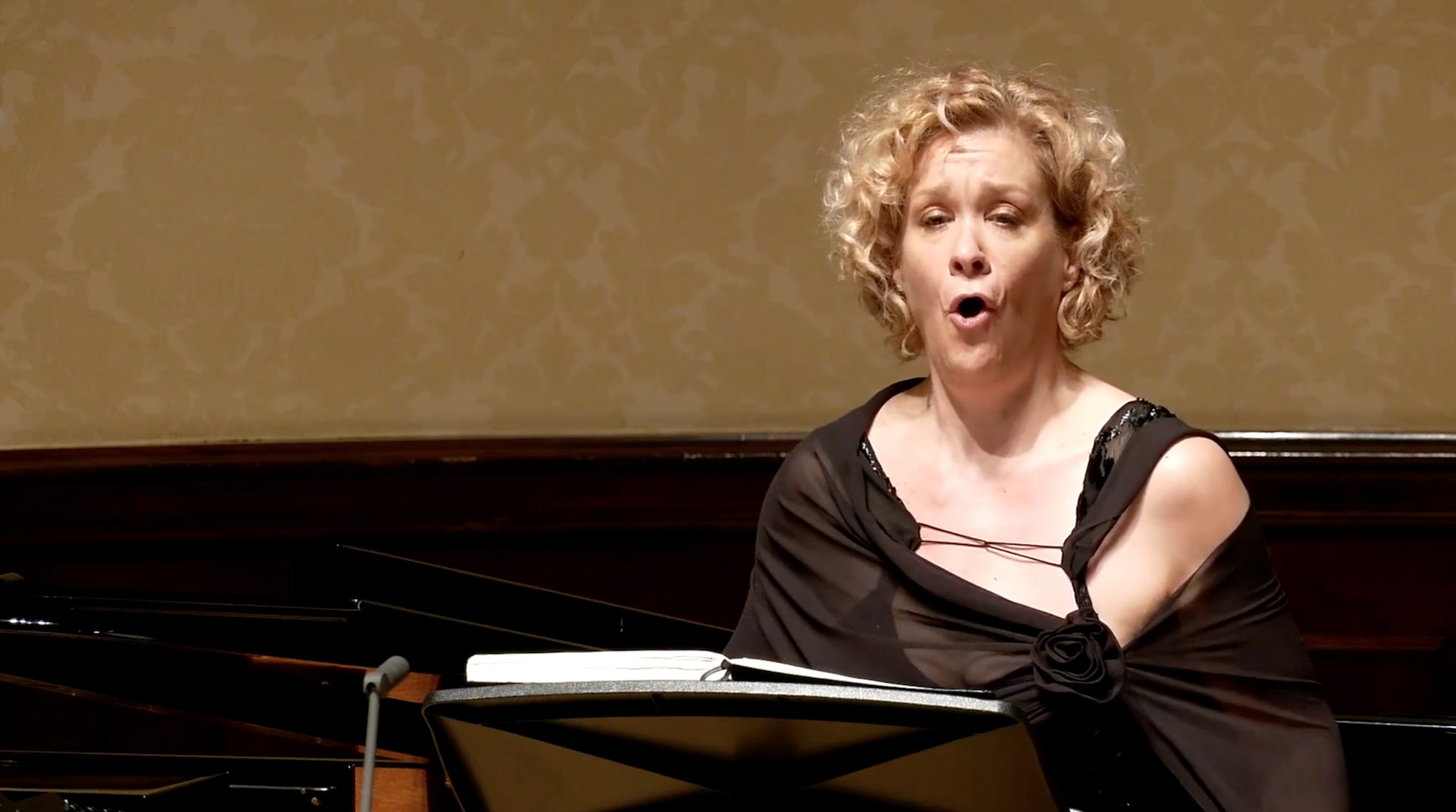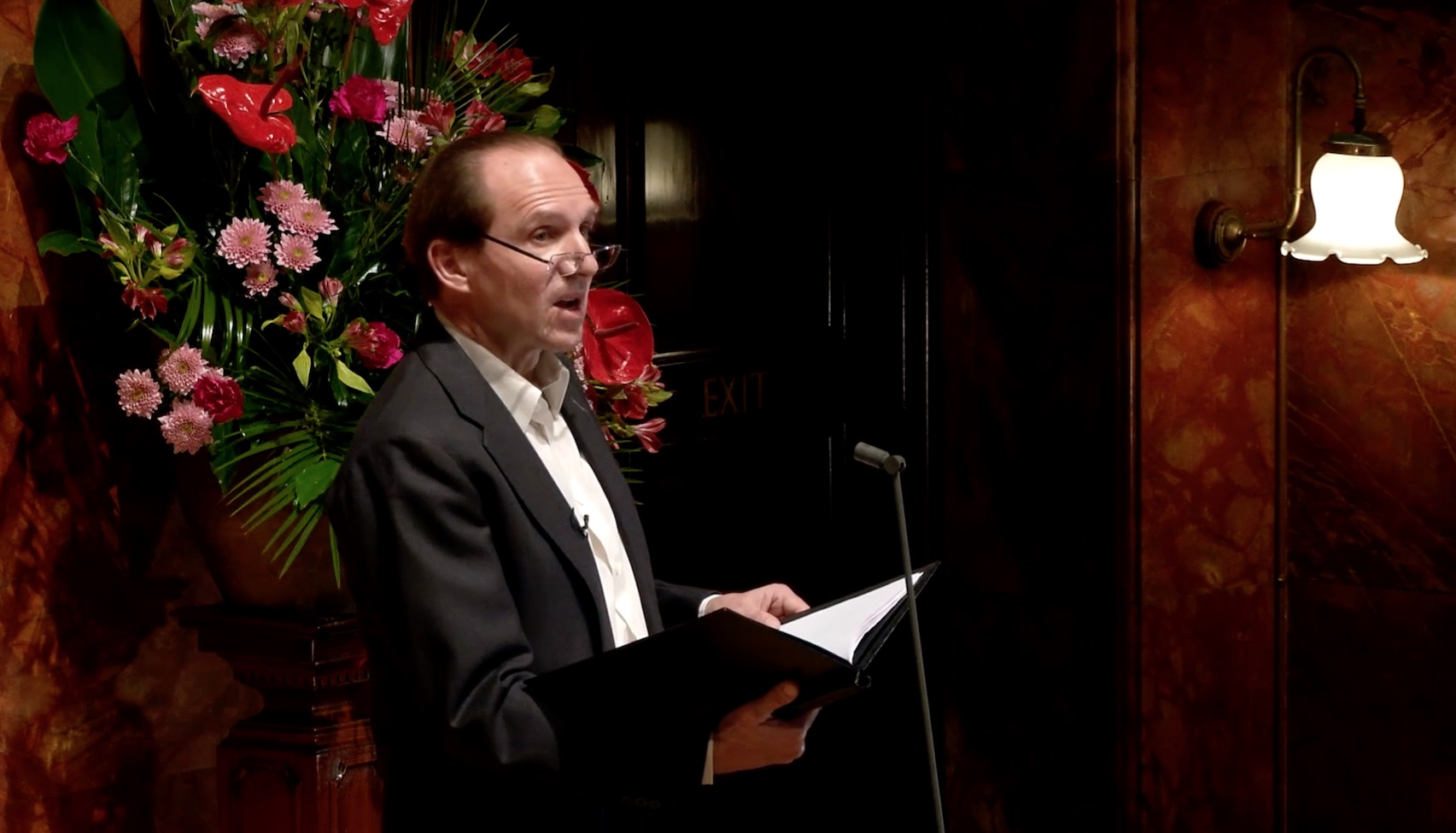Coote, Blackshaw, Fiennes, Wigmore Hall online review – lonely hearts club band | reviews, news & interviews
Coote, Blackshaw, Fiennes, Wigmore Hall online review – lonely hearts club band
Coote, Blackshaw, Fiennes, Wigmore Hall online review – lonely hearts club band
Tchaikovsky songs and Russian poems harmonise in a melancholy magic

Why, in Lieder singing above all, should an outpouring of deep feeling so frighten critics? Alice Coote’s unabashed emotionalism as a recitalist can sometimes bring out the worst in the stiff-upper-lip brigade, as reactions to her high-impact Winterreise (last given at the Wigmore prior to the current lockdown) revealed.
Christian Blackshaw accompanied, which meant luxury casting all round. It made for a drama-packed, as well as a star-spangled, 80 minutes. Coote (pictured below) took a dozen songs (sung in her finely articulated Russian) from the different volumes of “romances” that Tchaikovsky composed throughout his career. They came enriched not only by eight poems delivered by Fiennes, but by four selections from Tchaikovsky’s letters. Together, the items built into a kind of portrait of the musical artist as an anguished, yearning soul, in thrall to both unrequited love and restless creativity, with the poems as a choric commentary on themes embedded in the songs. The event’s title, Tchaikovsky and his Poets, did perhaps sow a little confusion. Some of the songs set other lyrics by the poets Fiennes read (Pushkin, Lermontov and Afanasy Fet) but most did not. For instance, the reliably show-stealing “None but the Lonely Heart” (which, by the way, none but Frank Sinatra absolutely nailed in his late-1940s heyday) comes from verse by Goethe.
 It goes without saying (or it should) that Coote’s mezzo is an all-terrain vehicle of awesome powers. It scaled every peak and trough of feeling on Tchaikovsky’s map of longing, regret and desolation with accomplished ease. In the absence of a physical audience in the Wigmore, she hugged the virtual public close, enlisting a spectrum of gestures and a generous dynamic range to conjure the intimacy that our performing circumstances still forbid. Though often wistful, mournful and unbearably tender, Tchaikovsky’s writing for the voice seldom goes in for outright melodrama. And Coote’s passages of subdued yearning and weary resignation, in “Do not believe, my friend” or “Not a word, my friend”, proved just as affecting as the relentless snowball of anguish in “Why?” or the fortissimo climax of “Love of a dead man”.
It goes without saying (or it should) that Coote’s mezzo is an all-terrain vehicle of awesome powers. It scaled every peak and trough of feeling on Tchaikovsky’s map of longing, regret and desolation with accomplished ease. In the absence of a physical audience in the Wigmore, she hugged the virtual public close, enlisting a spectrum of gestures and a generous dynamic range to conjure the intimacy that our performing circumstances still forbid. Though often wistful, mournful and unbearably tender, Tchaikovsky’s writing for the voice seldom goes in for outright melodrama. And Coote’s passages of subdued yearning and weary resignation, in “Do not believe, my friend” or “Not a word, my friend”, proved just as affecting as the relentless snowball of anguish in “Why?” or the fortissimo climax of “Love of a dead man”.
Phrase by phrase, line by line, these were strongly shaped performances that recruited Coote’s prowess and control across her range to refine the emotional palette of the songs, rather than just overwhelm them. Many of the pieces, such as the gorgeous “The mild stars shone for us”, trace an aria-like curve of feeling. Coote knew how to plot each point along it with quietly reflective as well as splashily declamatory moments. Oddly, it was in “None but the lonely heart” itself that her phrasing and intonation once or twice sounded mannered and over-emphatic (Frank, of course, stays heart-breakingly cool). Amid the love-lorn solitude and abandonment, there was however scope in this selection for a few spells of a sunnier lyricism. In a piece such as “I bless you, forests”, Coote made them properly shine.
 The rippling, sparkling piano part to that song gave Christian Blackshaw a conspicuous opportunity to dazzle in his supremely tasteful way. Throughout, he sprinkled the accompaniment with touches of grace that avoided any sense of doomy portentousness: the passions here need no clumsy underlining. Across the stage, Ralph Fiennes punctuated the music with five iconic Pushkin lyrics, in addition to poems by Lermontov and Fet. The four chosen letters broadly traced the outlines of Tchaikovsky’s famously tortured inner life: his suppressed same-sex longings; his catastrophic, loveless marriage; his crippling self-doubt and morbid depression, allied to “an awful desire to compose”. Sometimes urbane, sometimes stricken, and never actorly in an obtrusive way, Fiennes (pictured above) made a sensitive, congenial third member of the impromptu trio. He spoke his Pushkin pieces with a particular relaxed authority. However, I had serious doubts about the stage Mockney he employed for the accent of the philistine masses who tease the bard in “The Poet and the Crowd”. These days, the voice of the sneering, bone-headed bigot who demands of true artists “Where’s the gain?” should surely belong to an offshore media billionaire – or, better, an Eton-schooled government minister.
The rippling, sparkling piano part to that song gave Christian Blackshaw a conspicuous opportunity to dazzle in his supremely tasteful way. Throughout, he sprinkled the accompaniment with touches of grace that avoided any sense of doomy portentousness: the passions here need no clumsy underlining. Across the stage, Ralph Fiennes punctuated the music with five iconic Pushkin lyrics, in addition to poems by Lermontov and Fet. The four chosen letters broadly traced the outlines of Tchaikovsky’s famously tortured inner life: his suppressed same-sex longings; his catastrophic, loveless marriage; his crippling self-doubt and morbid depression, allied to “an awful desire to compose”. Sometimes urbane, sometimes stricken, and never actorly in an obtrusive way, Fiennes (pictured above) made a sensitive, congenial third member of the impromptu trio. He spoke his Pushkin pieces with a particular relaxed authority. However, I had serious doubts about the stage Mockney he employed for the accent of the philistine masses who tease the bard in “The Poet and the Crowd”. These days, the voice of the sneering, bone-headed bigot who demands of true artists “Where’s the gain?” should surely belong to an offshore media billionaire – or, better, an Eton-schooled government minister.
- The Wigmore's stream of this concert is now available on the Hall's website on demand
- Read more classical music reviews on theartsdesk
rating
Share this article
Add comment
The future of Arts Journalism
You can stop theartsdesk.com closing!
We urgently need financing to survive. Our fundraising drive has thus far raised £49,000 but we need to reach £100,000 or we will be forced to close. Please contribute here: https://gofund.me/c3f6033d
And if you can forward this information to anyone who might assist, we’d be grateful.

Subscribe to theartsdesk.com
Thank you for continuing to read our work on theartsdesk.com. For unlimited access to every article in its entirety, including our archive of more than 15,000 pieces, we're asking for £5 per month or £40 per year. We feel it's a very good deal, and hope you do too.
To take a subscription now simply click here.
And if you're looking for that extra gift for a friend or family member, why not treat them to a theartsdesk.com gift subscription?
more Classical music
 Robin Holloway: Music's Odyssey review - lessons in composition
Broad and idiosyncratic survey of classical music is insightful but slightly indigestible
Robin Holloway: Music's Odyssey review - lessons in composition
Broad and idiosyncratic survey of classical music is insightful but slightly indigestible
 Bizet in 150th anniversary year: rich and rare French offerings from Palazzetto Bru Zane
Specialists in French romantic music unveil a treasure trove both live and on disc
Bizet in 150th anniversary year: rich and rare French offerings from Palazzetto Bru Zane
Specialists in French romantic music unveil a treasure trove both live and on disc
 Scottish Chamber Orchestra, Ibragimova, Queen’s Hall, Edinburgh review - rarities, novelties and drumrolls
A pity the SCO didn't pick a better showcase for a shining guest artist
Scottish Chamber Orchestra, Ibragimova, Queen’s Hall, Edinburgh review - rarities, novelties and drumrolls
A pity the SCO didn't pick a better showcase for a shining guest artist
 Kilsby, Parkes, Sinfonia of London, Wilson, Barbican review - string things zing and sing in expert hands
British masterpieces for strings plus other-worldly tenor and horn - and a muscular rarity
Kilsby, Parkes, Sinfonia of London, Wilson, Barbican review - string things zing and sing in expert hands
British masterpieces for strings plus other-worldly tenor and horn - and a muscular rarity
 From Historical to Hip-Hop, Classically Black Music Festival, Kings Place review - a cluster of impressive stars for the future
From quasi-Mozartian elegance to the gritty humour of a kitchen inspection
From Historical to Hip-Hop, Classically Black Music Festival, Kings Place review - a cluster of impressive stars for the future
From quasi-Mozartian elegance to the gritty humour of a kitchen inspection
 Shibe, LSO, Adès, Barbican review - gaudy and glorious new music alongside serene Sibelius
Adès’s passion makes persuasive case for the music he loves, both new and old
Shibe, LSO, Adès, Barbican review - gaudy and glorious new music alongside serene Sibelius
Adès’s passion makes persuasive case for the music he loves, both new and old
 Anja Mittermüller, Richard Fu, Wigmore Hall review - a glorious hall debut
The Austrian mezzo shines - at the age of 22
Anja Mittermüller, Richard Fu, Wigmore Hall review - a glorious hall debut
The Austrian mezzo shines - at the age of 22
 First Person: clarinettist Oliver Pashley on the new horizons of The Hermes Experiment's latest album
Compositions by members of this unusual quartet feature for the first time
First Person: clarinettist Oliver Pashley on the new horizons of The Hermes Experiment's latest album
Compositions by members of this unusual quartet feature for the first time
 Gesualdo Passione, Les Arts Florissants, Amala Dior Company, Barbican review - inspired collaboration excavates the music's humanity
At times it was like watching an anarchic religious procession
Gesualdo Passione, Les Arts Florissants, Amala Dior Company, Barbican review - inspired collaboration excavates the music's humanity
At times it was like watching an anarchic religious procession
 Classical CDs: Camels, concrete and cabaret
An influential American composer's 90th birthday box, plus British piano concertos and a father-and-son duo
Classical CDs: Camels, concrete and cabaret
An influential American composer's 90th birthday box, plus British piano concertos and a father-and-son duo
 Cockerham, Manchester Camerata, Sheen, Martin Harris Centre, Manchester review - re-enacting the dawn of modernism
Two UK premieres added to three miniatures from a seminal event of January 1914
Cockerham, Manchester Camerata, Sheen, Martin Harris Centre, Manchester review - re-enacting the dawn of modernism
Two UK premieres added to three miniatures from a seminal event of January 1914
 Kempf, Brno Philharmonic, Davies, Bridgewater Hall, Manchester review - European tradition meets American jazz
Bouncing Czechs enjoy their Gershwin and Brubeck alongside Janáček and Dvořák
Kempf, Brno Philharmonic, Davies, Bridgewater Hall, Manchester review - European tradition meets American jazz
Bouncing Czechs enjoy their Gershwin and Brubeck alongside Janáček and Dvořák

Comments
I really do wish that people
Not by any means all the time
Not by any means all the time, and he wrote some of the most joyous music ever, but there were undoubtedly times when he was 'morbidly depressed' - you only have to read his letters. Driven to attempt suicide over his disastrous marriage to cover up his homosexuality (if that's what you mean by 'thwarted in love'), and as for the end - jury's still out on that one. It doesn't do to cover up the depressive condition in creative artists any more than it needs to serve as a definition of who they were.